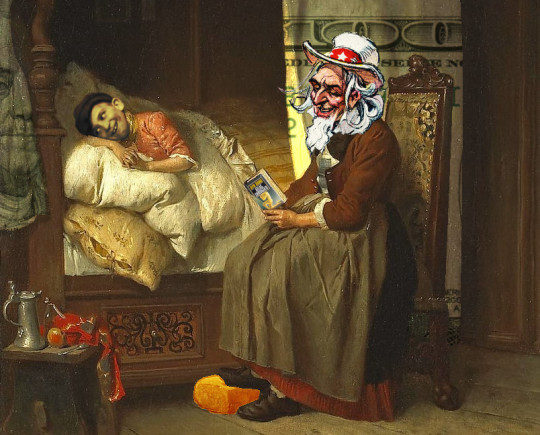#mfa days
Explore tagged Tumblr posts
Text
What have you done to your watch?
It's broken. The hour is divided into eighths
like inches.
The metronome pauses half a beat into
the measure
picks up somewhere else
And no one can identify a cause.
Time is ticking like a bomb. Everything's related
except the island where it isn't still exists.
Reality is fickle.
Sixty seconds makes sixty-one, because
something had to come first
didn't it?
Or was It zero?
A hidden number not acknowledged
zero is a ghost, undiagnosed, unreal
unlikely to appeal to the masses, niched
standing in a corner with its back against a wall
sliding to the floor with its hands over its face
a clock stops
it hits rock bottom
glass smashing to the ground, release of limbs
unfurled from confines, reaching out to find
experience
tick, tick
3 notes
·
View notes
Text
How America's oligarchs lull us with the be-your-own-boss fairy tale

If you'd like an essay-formatted version of this post to read or share, here's a link to it on pluralistic.net, my surveillance-free, ad-free, tracker-free blog:
https://pluralistic.net/2024/02/16/narrative-capitalism/#sell-job

Capitalism is a vibes-based system. Sure, we all know about Keynes's "Animal Spirits" that see "bulls" and "bears" vying to set the market's future, but beyond that, there's just a hell of a lot of narrative.
Writing for The American Prospect, Adam M Lowenstein reviews two books that tell the histories of the stories that are used to sell American capitalism to the American people – the stories that turn workers into "temporarily embarrassed millionaires":
https://prospect.org/culture/books/2024-02-16-stories-corporations-tell-williams-waterhouse-review/
The first of these books is Taming the Octopus: The Long Battle for the Soul of the Corporation, by Kyle Edward Williams, a kind of pre-history of "woke capitalism":
https://wwnorton.com/books/9780393867237
Taming is a history of the low-water marks for Big Business's reputation in America, and how each was overcome through PR campaigns that declared a turning point in which business leaders would pursue the common good, even at the expense of their shareholders' interests.
The story starts in the 1950s, when DuPont and other massive firms had gained a well-deserved reputation as rapacious profit-generation machines that "alienated workers and pushed around small businessmen, investors, and consumers." This prompted DuPont's PR chief, Harold Brayman, to write a memo called "The Attack on Bigness," where he set out a plan to sell America on a new cuddly image for corporate giants.
For Brayman, the problem was that corporate execs were too shy about telling their social inferiors about all the good that businesses did for them: "The businessman is normally reluctant to talk out loud. He frequently shuns the spotlight and is content with plugging his wares, not himself."
This was the starting gun for a charm offensive by American big business that included IBM president Thomas Watson Jr ("I think there is a world market for about five computers") going on a speaking tour organized by McKinsey & Co, where he told audiences that his company's billion dollar annual profits had convinced it to assume "responsibilities for the broader public welfare."
This set the template for a nationwide mania of "business statesmanship" that Fortune celebrated with an editorial announcing "a great transformation, of which the world as a whole is as yet unaware" that put the "profit motive…on its last leg."
Fortune then spent the next seventy years recycling this announcement, every time the tide went out on business's popularity. In 2019, Fortune platformed IBM president Ginni Rometty for an announcement that the company was orienting its priorities to the public good: "It’s a question of whether society trusts you or not. We need society to accept what it is that we do."
The occasion for Rometty's quote was a special package on the Trump tax-cuts, a trillion-dollar gift to American big business, which lobbyists for the Business Roundtable celebrated with an announcement that American capitalism would now serve "stakeholders" (not just shareholders). Fortune celebrated this "change" as "fundamental and profound."
Fast forward five years and corporate leaders are still telling stories, this time about "stakeholder capitalism" and "ESG" – the dread "woke capitalism" that has right-wing swivel-eyed loons running around, hair afire, declaring the end of capitalism.
For Williams and Lowenstein (and me), all this ESG, DEI, and responsible capitalism is just window dressing, a distraction to keep the pitchforks and torches in people's closets, and to keep the guillotines in their packaging. The right-wing is doing a mirror-world version of liberals who freak out when OpenAI claims to have built a machine that will pauperize every worker – assuming that a PR pitch is the gospel truth, and then repeating it in criticism. Criti-hype, in other words:
https://sts-news.medium.com/youre-doing-it-wrong-notes-on-criticism-and-technology-hype-18b08b4307e5
Think of ESG: the right is freaking out that ESG is harming shareholders by leaving hydrocarbons in the ground to appease climate-addled greenies. The reality is that ESG is barely disguised greenwashing, and it's fully compatible with burning every critter that died in the Mesozoic, Cenozoic, and lo, even the Paleozoic:
https://pluralistic.net/2022/03/15/sanctions-financing/#profiteers
The reason this tactic is so successful is that Americans have also been sold another narrative: that American problems are solved by American individuals as entrepreneurs and businesspeople, not as polities or as members of a union (let alone the working class!).
This is the subject of the second book Lowenstein reviews, One Day I’ll Work for Myself: The Dream and Delusion That Conquered America, by Benjamin Waterhouse:
https://wwnorton.com/books/one-day-ill-work-for-myself/
A keystone of American narrative capitalism is the idea that the USA is a nation of small businesspeople, Jeffersonian yeoman farmsteaders of the US economy. But even a cursory examination shows that the country is ruled – economically and politically – by very large firms.
Uber sells itself as a way to be your own boss ("No shifts. No boss. No limits.") – even though it's a system where the app is your boss, and thanks to that layer of misdirection, Uber gets to be the worst conceivable boss, while its workers have no recourse in labor law:
https://pluralistic.net/2023/04/12/algorithmic-wage-discrimination/#fishers-of-men
In labor fights, Uber represents itself as the champion of innumerable "small businesspeople" who drive its unlicensed taxis. In consumer protection fights, Amazon claims to be fighting for "small businesspeople" who sell on its platform. In privacy fights, Facebook claims to represent "small businesspeople" who buy its surveillance advertising.
But large firms are actively hostile to small firms, seeing them as small-fry to be rooked or destroyed (recall that when Amazon targeted small publishers for bankruptcy-level discounts, they called the program "The Gazelle Project" and Bezos told his executives to tackle these firms "the way a cheetah pursues a sickly gazelle").
Decades of this tale have produced "a profound shift from a shared belief that individuals might come together to solve problems, into a collective faith in individual effort." America's long love-affair with rugged individualism was weaponized in the 1970s by corporations seeking to shed their regulatory obligation to workers, customers, and the environment.
As with Big Tech today, the big business lobby held up mom-and-pop businesses as the true beneficiaries of deregulation, even as they knifed these firms. A telling anecdote comes from someone who worked for the Chamber of Commerce's magazine Nation's Business: when this editor pointed out that many of the magazine's subscribers were small businesspeople and asked if they could start including articles relevant to mom-and-pops, the editor in chief said, "Over my dead body."
The neoliberal era has been an unbroken string of platitudes celebrating the small business and policies that annihilate their chances against large firms. Ronald Reagan's dewy-eyed hymns to American entrepreneurship sounded nice, but what matters is that he attempted to abolish the Small Business Administration and refused to address the 20,000 attendee "White House Conference on Small Business."
In the years since, American has sacrificed its small businesses while pulling out all the stops – bailouts and tax cuts and elite bankruptcy – to keep its largest firms growing. New regulations like Dodd-Frank were neutered in the name of saving mom-and-pop shops, even though the provisions that were cut already exempted small businesses.
Today, millions of Americans are treading water in a fetid stew of LLC-poisoning, rise-and-grind, multi-level-marketing, dropshipping and gig-work, convinced that the only way to get a better life is to pull themselves up by their bootstraps:
https://pluralistic.net/2023/04/10/declaration-of-interdependence/
Narrative does a lot of work here. The American economy runs on bubbles, another form of narrative capitalism. Take AI, a subject I sincerely wish I could stop hearing about, not least because I'm certain that 99% of that thinking is being wasted on whatever residue remains after the bubble pops:
https://locusmag.com/2023/12/commentary-cory-doctorow-what-kind-of-bubble-is-ai/
AI isn't going to do your job, but its narrative may convince your boss to fire you and replace you with a bot that can't do your job. Like what happened when Air Canada hired a chatbot to answer customer inquiries and it started making shit up about bereavement discounts that the company later claimed it didn't have to honor:
https://bc.ctvnews.ca/air-canada-s-chatbot-gave-a-b-c-man-the-wrong-information-now-the-airline-has-to-pay-for-the-mistake-1.6769454
This story's been all over the news for the past couple of days, but so far as I've seen, no one has pointed out the seemingly obvious inference that this chatbot probably ripped off lots of people. The victim here was extraordinarily persistent, chasing a refund for 10 weeks and then going to the regulator. This guy is a six-sigma self-advocate – which implies a whole bell-curve's worth of comparatively normal people who just ate the shit-sandwich Air Canada fed them.
The reason AI is a winning proposition for Air Canada isn't that it can do a customer service rep's job – it can't. But the AI is a layer of indirection – like the app that is the true boss of Uber drivers – that lets Air Canada demoralize the customers it steals from into walking away from their losses.
Nevertheless, the narrative that AI Will Change Everything Forever is powerful – more powerful than AI itself, that's for sure. Take this Bloomberg headline: "Nearly all wealth gained by world's rich this year comes from AI":
https://www.business-standard.com/world-news/nearly-all-wealth-gained-by-world-s-rich-this-year-comes-from-ai-124021600006_1.html
Dig in and you find even more narrative. The single largest beneficiary of AI stock gains last year was Mark Zuckerberg ($161B!). Zuck is American Narrative Capitalism's greatest practitioner: the guy who made billions peddling a series of lies, from "pivot to video" to "metaverse," leaping from one lie to the next just ahead of the mass stock-selloffs that wiped out lesser predators.
The Narrative Capitalism Cinematic Universe has a lot of side-plots like AI and entrepreneurship and woke capitalism, but its main narrative arc was articulated, ad nauseum, by Margaret Thatcher: "There is no alternative." This is the most important part of the story, the part that says it literally can't be otherwise. The only way to organize society is through markets, and the only way to organize markets is to leave them alone, no matter how much suffering they cause.
This is a baffling story, because it's so easily disproved. Zuck says the only way to have friends is to let him surveil you from asshole to appetite, even though he once ran Facebook as the privacy-forward alternative to MySpace, and promised never to spy on you:
https://lawcat.berkeley.edu/record/1128876
Likewise, the business leaders – and their chorus of dutiful Renfields – who insist that monopoly is the natural and inevitable outcome of any market economy just handwave away the decades during which anti-monopoly enforcement actually kept most businesses from getting too big to fail and too big to jail.
I'm no champion of market efficiency – especially not as the best and final arbiter of social and economic questions – but when I hear my comrades repeating the Thatcherite claims that all forms of capitalism necessarily degrade into monopolistic quagmires, that there is no alternative, it sounds like more criti-hype.
This is a frequent point of departure during discussions of enshittification: some people dismiss the whole idea of enshittification as "just capitalism." But we had decades of digital services that either didn't degrade, or, when they did, were replaced by superior competitors with a minimum of switching costs for users who migrated from the decaying incumbent to greener pastures.
The reality is that while there are problems with all forms of capitalism, there are different kinds of capitalist problems, and some forms of capitalism are less harmful to working people and more capable of enacting and enforcing sound policy than others.
Enshittification is what happens when the constraints on the worst impulses of companies and their investors and managers are removed. When a company doesn't have competitors, when it can capture its regulators to trample our rights with impunity, when it can enlist those regulators to shut down would-be competitors who might free us from its "walled garden," and when it can fire any worker who refuses to enact harm upon the users they serve, then that company will enshittify:
https://pluralistic.net/2024/01/30/go-nuts-meine-kerle/#ich-bin-ein-bratapfel
A company can be made to treat you well, even if it is run by a wicked person who sees you as a mark to be fleeced – that mustache twirler just has to be constrained – by competition, regulation, self-help and labor. He may still hate you and wish you harm, but he won't be able to act on it.
As MLK said:
It may be true that the law cannot make a man love me, religion and education will have to do that, but it can restrain him from lynching me. And I think that's pretty important also. And so that while legislation may not change the hearts of men, it does change the habits of men. And we see this every day.
#pluralistic#narrative capitalism#oligarchy#temporarily embarrassed millionaires#late-stage capitalism#enshittification#disenshittification#vocational awe#fobazi ettarh#ai#bubbles#bubblenomics#rise and grind#Benjamin C. Waterhouse#One Day I’ll Work for Myself#Kyle Edward Williams#Taming the Octopus#woke capitalism#llcs with mfas
178 notes
·
View notes
Photo


Dress
c.1865
United States
Museum of Fine Arts, Boston (Accession Number: 50.3988a-c)
#day dress#fashion history#historical fashion#1860s#crinoline era#united states#19th century#reconstruction era#gold#brown#silk#taffeta#mfa boston#i am intrigued by this odd peplum situation#very proto bustle look
422 notes
·
View notes
Text
listen up lizards… big news…………… i’m starting a fiction MFA in the fall :) yahoo
#i never thought this day would come. mostly because MFAs are………. Yeah#BUT HERE WE ARE#MAKING IT OUR OWN#~
28 notes
·
View notes
Text
my uncle just asked me “what all this studying will help with” when i’m “just going to end up marrying & living abroad with my (specified hindu, brahmin) husband”. like no.1 fuck yr casteist & sexist ass & no.2 hohoho. youre in for a huuuuge surprise buddy!!!!
#fuck this brahmin casteist family yaar#canr wait to get out of here......bfa mfa phd im coming for you!!!!#can't wait to announce that im marrying a woman to this uncle specifically one day#মৃণাল
5 notes
·
View notes
Text


Purple and Black Silk Dress, 1860s, American.
MFA Boston.
#womenswear#extant garments#silk#dress#19th century#mfa boston#american#usa#purple#black#day dress#1860s usa#1860s dress#stripes
30 notes
·
View notes
Text
me leaving the house during the hottest part of day bc i couldn’t get my ass out of bed earlier when it was cooler: this is fine
#doing my 'walk around the city' day even tho it’s 100 degrees out bc i’m stubborn like that#i’ll be at the mfa during the hottest parts tho#is the plan lol
2 notes
·
View notes
Text

St. Stephen Protomartyr (panel from the Pala Tornabuoni triptych), Domenico Ghirlandaio, between 1490 and 1498
#Saint Stephen#St. Stephen#St. Stephen's Day#Boxing Day#art#art history#Domenico Ghirlandaio#religious art#Christian art#Christianity#imaginary portrait#Renaissance#Renaissance art#Italian Renaissance#Florentine Renaissance#Quattrocento#Italian art#15th century art#Museum of Fine Arts Budapest#MFA Budapest#tempera on panel
47 notes
·
View notes
Text
Life is a long sigh
I've felt a lot of heaviness lately, I'm compressing the weight and scale of it all just to say It feels so lonely today - benitannachortam
3 notes
·
View notes
Text
I think I have like 5 Jews following me . Hi
#I post in ways that would make jumblr scratch their heads#but also I wish there were less people I would have to worry about alienating sometimes#that’s not my intention but sometimes I think about systems of power + history + art and I have to save it for the drafts#Jesus is not my friend from art history anymore he hasn’t been since I had a very weird day at the mfa in like. march#like I had one of those Ferris Bueller Seurat moments in front of a painting of Jesus and I felt like I was going to die#it was right around the time I was obsessively researching the Holocaust and the actual material structure of the museum#+ it’s display practices made me really uncomfortable and I haven’t been back since actually#in the past year they’ve been trying to improve how they handle Jewish culture + art but they are. not succeeding in my opinion#also they’re working with like. every Israeli backed organization in Boston so that’s a whole nother can of worms
7 notes
·
View notes
Text
Orientation social for my grad program went so great aaaa! 🤓
I was confident, initiated conversations, met people, captivated small crowds by talking about things I like. I daresay I was less awkward than some of the professors. WHO WAS THAT.
When therapy pays off AND you find Your Shit. 💪
I made a connection that's going to get me on the literary journal early. I was introduced as a "dedicated student" (class doesn't start until Monday 😅) and called "impressive" (my crack). There was some kind of weird shock reaction that I didn't know what to make of but seemed unanimous when I (half-joking) said I was more worried about scaring everyone else than I was nervous myself. I came in late, but the director recognized me, and gave up his seat at the head of the table. (No pressure, right?! 😂)
I keep joking that this program is not ready for me omg I think it's so great hi I love being 30.
#lamour stories#in which I just gush about grad school#i might need to think of a new tag#aaaaaaaaaa#creative writing#nerd shit#mfa days
5 notes
·
View notes
Note
hiya! would you consider selling prints of your MCR art? :)
I think this is in regards to some of the older works I've made, specifically the Three Cheers piece yeah?
Unfortunately, I lost the working files to my older work in a data crash a couple years ago, which led me to losing the ability to make high-res prints of my older stuff.
I appreciate the interest though! But sadly, I don't think I'll ever get the motivation to redraw those pieces for print purposes.
rip to my lost archive </3
#art#ask me stuff#shout out to the entire MFA thesis I lost during that crash#really was the worst day in quarantine by far
12 notes
·
View notes
Photo

Day Dress
Charles Frederick Worth
c.1870
Museum of Fine Arts, Boston (Accession Number: 2002.696.1-5)
#day dress#fashion history#historical fashion#charles frederick worth#1870s#house of worth#bustle era#1870#19th century#purple#off white#silk#lace#france#belle epoque#second empire#second french empire#mfa boston#gimme pictures of the evening bodice MFA boston
430 notes
·
View notes
Text










Taiwan: Days 16-17
#I’m at the airport#buying a Hojicha latte and trying not to cry#my friend took the Uber with me to airport and helped me check my bags and stayed with me until it was time to do customs#I’m normally okay with airport goodbyes#but this one was hard#taiwan was an amazing place (esp. to explore with her) and I hope I’ll come back one day#not the stones#me stuff#taiwan#taipei#(we spent the last day seeing an Edward Yang exhibit at the MFA and finishing up some last minute shopping I needed to do and getting food)
6 notes
·
View notes
Text

Beige Silk Day Dress, ca. 1855, American.
MFA Boston.
#beige#womenswear#extant garments#silk#dress#mfa boston#19th century#american#usa#1855#1850s#1850s usa#1850s dress#day dress#daytime#Parker ladies
15 notes
·
View notes
Text
was too tired to post about this last night but yesterday i went to the mfa to checkout two temp exhibits leaving in mid-feb and both of them really exceeded my expectations!
matthew wong: the realm of appearances
tiny treasures: the magic of miniatures
the realm of appearances was really a hidden gem, imo. i wasn't expecting much from the previews i saw online and i didn't really connect with his early work but oh man his later paintings that delve into landscape and the color blue especially were frankly amazing. love the color blue so there's bias there whoops and i love the impressionist era which he took a lot of insp from so whoops there's more bias there lol, but really, i loved his color work. he had this really cool technique of scraping wet paint off for super cool texturing and color also which really caught my eye.
tiny treasures was just fun. i love miniatures. a really nicely curated collection that hit on a bunch of different themes. i got the exhibit companion book lol
also picked up 'fashioned by sargent' which was sold out last time i was there and i am so pleased with the purchase 🥰
#ran errands yesterday morning went to the mfa and then a dinner party; it was a good day#today? well i was in bed until like 2:30pm lmao so#at least laundry is in the wash :')#making some more progress with cleaning my room and purging stuff i don't need so#slow but steady progress
3 notes
·
View notes